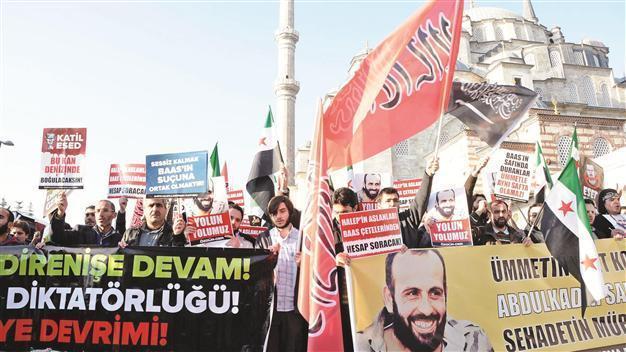Rising German football star joins list of 'players-turned-jihadists'
JAMES M. DORSEY

A group of protesters gathered in Istanbul’s historic Fatih Mosque to mark a religious ceremony for Burak Karan in his absentia after his death. The young footballer’s death moved many to sadness. DHA Photo
When Burak Karan, an up-and-coming German-Turkish football star, was killed last month during a Syrian military raid on anti-Bashar al-Assad rebels near the Turkish border, he joined a list of football players turned militants who were in the Middle East and North Africa or had roots in the region or in Islam.
In contrast to Palestinian suicide bombers in Israel a decade ago who were rooted in a West Bank football team, the 2004 Madrid train bombers who played the beautiful game together or several Saudi players who joined the anti-American jihad in Iraq following a fatwa or religious ruling by conservative Muslim preachers denouncing football as a game of the infidels, it was not immediately clear whether Mr. Karan was driven to give up his promising football career by a radical interpretation of Islam or a deep-seated humanitarian concern for the victims of brutal wars like that in Syria.
What Mr. Karan shared with players-turned-jihadists as well as various jihadist leaders including Osama Bin Laden, Hamas Gaza foreman Ismail Haniyeh and Hezbollah chief Hassan Nasrallah was a deep-seated passion for the sport and that their road towards militancy often involved an action-oriented activity, football. Mr. Karan’s case is nevertheless more similar to that of Yann Nsaku or Nizar ben Abdelaziz Trabelsi, individuals who radicalized, rather than the Hamas or Madrid bombers or the Saudi players who turned militant in the context of a group.
Mr. Nsaku, a Congolese-born convert to Islam and former Portsmouth FC youth center back, was one of 11 converts arrested in France a year ago on suspicion of being violent jihadists and for “suspected Islamic terrorist plotting of anti-Semitic attacks,” according to French police. Police said the group aimed to spark a “war across France” with the intention of imposing Islamic law.
A 19-year-old, 6’2” player, Mr. Nsaku was signed in 1998 by Portsmouth from Cannes FC but never made it into the troubled 2008 FA Cup winners’ first team. His promising career ended in 2011 when he suffered a knee injury.
Mr. Trabelsi, a Tunisian who played for Germany’s Fortuna Düsseldorf and FC Wuppertal, was arrested and convicted in Belgium a decade ago on charges of illegal arms possession and being a member of a private militia. Mr. Trabelsi was sentenced to 10 years in prison.
In all cases, football proved to be a fruitful grooming if not recruiting ground. Mr. Karan may not have been recruited off the pitch and instead have reached out to individuals or groups who could help him join a militant cause. However, men like assassinated Bin Laden and Messrs. Haniyeh and Nasrallah recognized the game’s useful bonding and recruitment qualities. It brings recruits into the fold, encourages camaraderie and reinforces militancy among those who have already joined.
Death published on YouTubeUnlike Mr. Nsaku, 26-year-old Mr. Karan, who adopted the nom de guerre Abu Abdullah al-Turki, appeared to be destined for stardom, before he opted out at age 20 in favor of the Syrian struggle. He had played internationally seven times for Germany alongside such football giants as Sami Khedira, Kevin-Prince Boateng and Dennis Aogo.
Mr. Karan’s death by a bomb dropped by the Syrian air forces in the village of Azaz, near the Turkish border, became public in a an almost seven-minute YouTube video believed to have been posted by an unidentified Islamist group. Amid ideological justifications of jihad and pictures of him with children whose faces are unidentifiable but are believed to be his sons who, together with his 23-year-old wife, travelled with him to Syria, as well a Kalashnikov rifle, Mr. Karan asks his mother in Arabic not to bemoan his death. Speaking to German media, Mr. Karan’s brother Mustafa cast doubt on the video saying Burak struggled to speak Arabic.
A text in Arabic and German cautioned “not to assume that those who died on Allah’s way are dead. No. They are alive with their Lord and being taken care of… Those that listened to Allah and the Messenger (Prophet Mohammed) after they suffered a wound – for those among them who do good and are fearful of God, there will a fabulous reward.”
Mr. Karan’s jihadist history appears to suggest that he prepared for his engagement in Syria alongside an estimated 200 other Germans mostly of Turkish origin, while in an al-Qaeda training camp in Pakistan. German intelligence sources said Mr. Karan had first appeared on their radar because of his contacts with Emrah Erdoğan, a German Turk, who was arrested a year ago in Tanzania on suspicion of involvement in the bombing of a Kenyan shopping center and extradited to Germany, and according to German news magazine Der Spiegel, with Austrian-Egyptian imam Mohamed Mahmoud.
Mr. Erdoğan is on trial in Frankfurt on charges of being a member of al-Qaeda in Pakistan and of the al-Shabab in Somalia. He is alleged to have been in the Pakistan-Afghan border region in 2010 and to have then joined al-Shabab.
Mr. Mahmoud was an imam at a mosque in the western German town of Solingen and leader of an Islamist group called Millatu-Ibrahim that was banned in Germany last year for “efforts against the constitutional order and against the concept of international understanding.” He evaded arrest at the time but has since been detained in Turkey where he is believed to be in prison.
Mr. Karan joined the rebels after collecting relief donations and sending food and drugs to Syria. “If he armed himself it was to protect transports. Was he supposed to throw stones? He always told me he doesn’t want to fight,” his brother Mustafa told Bild Zeitung.
